Are you getting enough protein from your vegetables? It’s important to make sure we’re adding enough of these nutrient-dense foods to our diet. Unfortunately, many of us weren’t raised eating a lot of vegetables. However, with more and more information about the benefits of incorporating vegetables into our diets, it’s never been easier (or more delicious!) to get your daily dose.
If you’re just starting out on your journey towards consuming more veggie-packed meals, take a look at this list to learn about some of the best high-protein vegetables that you can add to your diet. We’ve provided the approximate amount of protein per 100g serving size so you can easily incorporate them into your meals!
Rich Protein-packed Vegetables
Eating vegetables may not provide the same amount of protein as animal proteins and protein powders, but it can still be an important source of this macronutrient. When you combine veggies with your meals, you’ll start to notice your protein intake increasing. Plus, you’ll also enjoy the wealth of vitamins, fiber, and other benefits that come with a vegetable-rich diet. These can include better skin, stronger bones, improved mood, and increased energy. All of these advantages illustrate why adding more vegetables to your meals is worthwhile.
Mushrooms
1.5 grams of protein & 31 Calories
Try tossing them in with your eggs in the morning, sautee them with purple onions, sautee them with garlic, or toss them in any pasta. The nutritional value of mushrooms is light & you can pretty much toss them in anything.
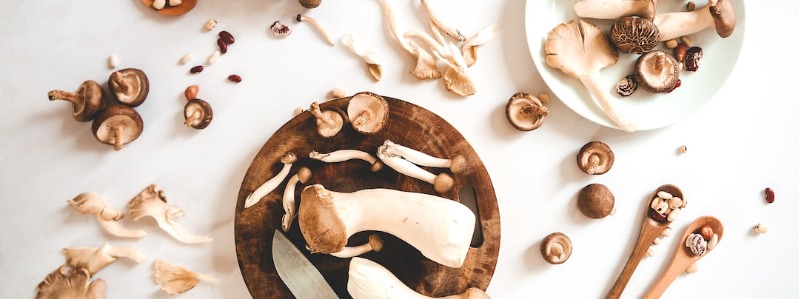
Mushrooms are a great source of protein and other important vitamins and minerals. They are loaded with antioxidants, which help to protect cells from damage caused by free radicals. Mushrooms are also high in essential amino acids that help build strong muscles and boost energy production. One cup of cooked mushrooms contains 4 grams of protein, making them an excellent addition to any meal or snack. In addition to protein, mushrooms also contain B vitamins, vitamin D, potassium, iron, zinc, and manganese. These nutrients are essential for optimal health and performance.
Mushrooms come in different varieties, such as white button, cremini, and shiitake. All mushrooms offer similar nutritional value, but some may be more beneficial than others depending on their particular differences in nutrient content. For instance, shiitake mushrooms have been found to have anti-inflammatory properties and provide additional cardiovascular benefits, whereas cremini mushrooms provide extra selenium which helps to promote healthy thyroid function.
Asparagus
2.2 grams of protein & 20 Calories
I like to drizzle olive oil on Asparagus and sprinkle sea salt and pepper on them and maybe a squeeze of lemon juice.
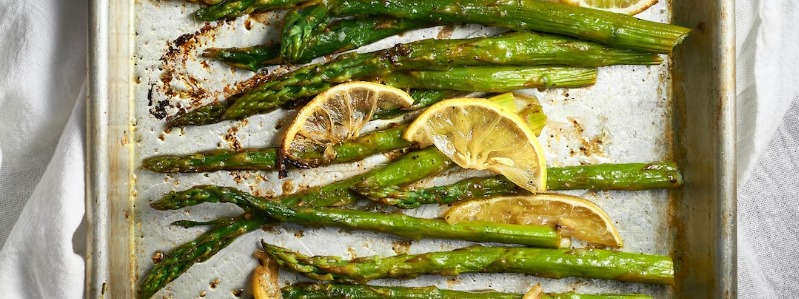
Asparagus is an incredibly nutritious and high-protein vegetable. It is a great source of vitamins A, C, E, and K, as well as minerals like iron, magnesium, calcium, zinc, and selenium. Additionally, it is an excellent source of dietary fiber, which helps to support good digestion. Asparagus contains up to 2g of protein per cup, making it one of the highest protein vegetables available. This makes it a great option for those looking to boost their protein intake without relying on animal sources.
Its low-calorie content makes it a great choice for people looking to lose or manage their weight. Asparagus can be enjoyed in a variety of dishes both hot and cold, including salads, stir-fries, casseroles, soups, omelets, and more. Plus, its versatility makes it easy to incorporate into any meal plan. Whether you’re trying to increase your protein intake or add a little extra nutrition to your meals, asparagus is an excellent choice.
Spinach
2.4 grams of protein & 24 Calories
I think we all know it’s extremely easy to sneak spinach into pretty much anything. Quick tip, while 100 grams of uncooked spinach sounds like a lot 100 grams of cooked spinach, defies that. Put spinach in a smoothie, throw it in your eggs, toss it in pasta, and even make a dip or a soup.

When it comes to high-protein vegetables, spinach is at the top of the list. Not only does spinach offer a generous amount of protein (3.6 grams per cup), but it also contains essential vitamins and minerals, including iron, magnesium, and calcium. Spinach is also packed with dietary fiber and antioxidants, making it a nutrition-packed superfood.
Spinach can be enjoyed raw, cooked, or even blended into smoothies and juices. It’s an ideal ingredient for salads, stir-fries, soups, omelets, frittatas, and more. And because of its mild flavor, it’s a great way to add a nutritional boost to just about any dish. Plus, it takes only minutes to prepare!
Broccoli
2.8 grams of protein & 34 Calories
Ever since I got an air fryer, my life has changed. Broccoli is one of my favorite veggies to throw in there, just spray a little olive oil and add a dash of sea salt and omg you have perfection. Then you can dip it in some roasted red pepper hummus to make it even better.
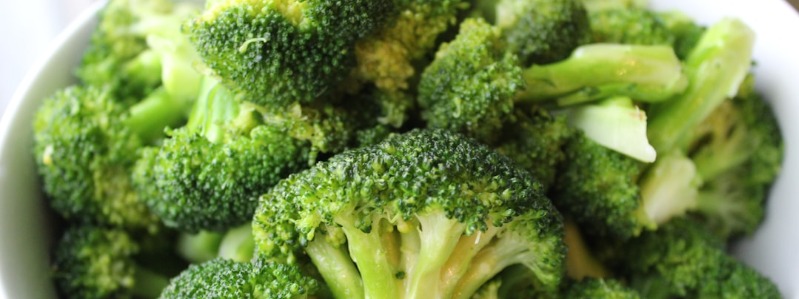
Broccoli is a powerhouse vegetable that provides high protein with many other essential nutrients. This cruciferous plant is a great addition to a balanced, plant-based diet thanks to its impressive composition of vitamins, minerals, and dietary fiber. One cup of cooked broccoli contains four grams of protein, helping you get closer to your daily nutritional goals with each delicious bite.
Broccoli is also chock-full of disease-fighting antioxidants like Vitamin C which can help reduce inflammation in the body while promoting strong bones and healthy skin. It’s also an excellent source of folate and iron, both of which are necessary for proper cognitive development and immune system functioning. To maximize the protein content in your meals, try roasting or steaming your broccoli and topping it off with plant-based proteins like tempeh, tofu, or nut butter. Incorporating high-protein vegetables like broccoli into your diet helps ensure you get enough protein without relying heavily on animal-based foods.
Brussel Sprouts
3.5 grams of protein & 41 Calories
I’ve heard they have a bad rep, but I love them, especially in the oven. This is also another vegetable I had never even heard of growing up. I also add olive oil and sea salt, haha I guess you can see my trend here is that I always like to keep things simple yet delicious, always delicious.
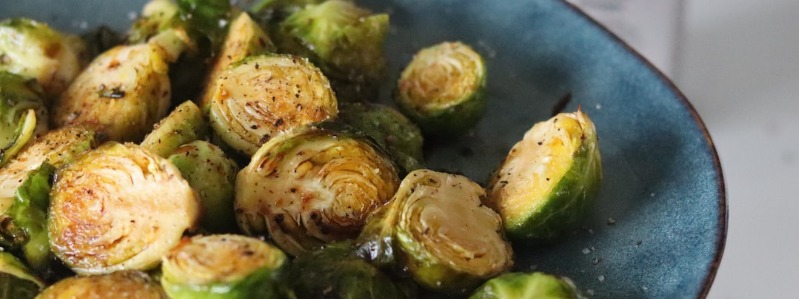
Brussels sprouts are often described as a superfood thanks to their rich source of protein and essential nutrients. A single serving of cooked Brussels sprouts contains nearly 4 grams of protein, which is notable considering that most vegetables contain minimal amounts of this important macronutrient. They also contain several vitamins and minerals such as vitamin C, vitamin K, and folate.
Eating Brussels sprouts can help you meet your dietary needs for these vital nutrients. Furthermore, they are a great addition to any meal due to their distinctive flavor and texture. When prepared correctly, they can be savored as part of salads, side dishes, or entrees. Whether roasted, steamed, or boiled, Brussels sprouts turn every dish into something special. As with all vegetables, moderation is key to ensure the most nutritional benefit; enjoy them in harmony with other nutritious vegetables in your diet.
Yellow Corn
3.5 grams of protein & 82 Calories
Yummy! Okay, finally, a vegetable I did grow up eating but only because my family loves it tossed in rice or on a cob prepped Mexican style. Roast your corn for a sweet taste.
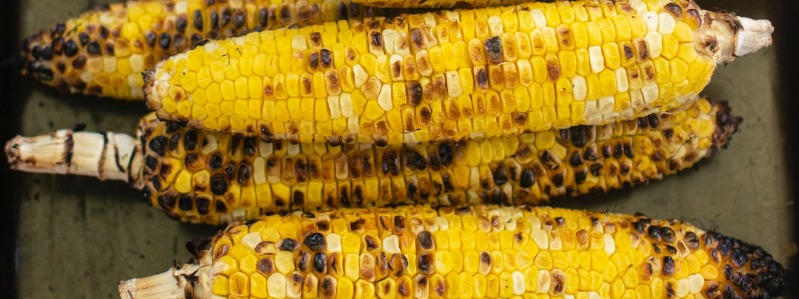
Yellow corn is an excellent source of protein, containing up to 17 grams of the macronutrient per cup. This variety of corn is packed with essential vitamins and minerals such as magnesium, zinc, potassium, and folate. Its high levels of dietary fiber make it a great choice for promoting digestive health and regulating blood sugar levels. Yellow corn’s high concentration of antioxidants works to reduce inflammation throughout the body, while its unique amino acid profile helps to build muscle and boost energy levels. Additionally, yellow corn is low in calories, making it a perfect addition to any diet plan. Enjoy yellow corn steamed, roasted, grilled, or boiled for a delicious and nutritious meal.
Peas
5.4 grams of protein & 81 Calories
These bad boys are packed with protein. Sprinkle peas in your rice, in your pasta, make a soup, or toss in a salad.

Peas are a perfect source of protein for those following a vegetarian or vegan diet. These small green legumes pack an impressive 9 grams per cup, which makes them one of the most protein-dense vegetables around. In addition to being high in protein, peas are also rich in dietary fiber, vitamins A and C, iron, and folate, making them an incredibly nutritious option.
They also contain phytonutrients such as flavonoids and carotenoids that can reduce inflammation and lower the risk of certain chronic diseases. Peas are also incredibly versatile. They can be included in soups, salads, Pasta dishes, stir-fries, and much more. Whether you choose to eat them steamed, boiled, or frozen, peas are an easy way to get more protein into your diet.
Lima Beans
8 grams of protein & 115 calories
You may question whether lima beans are a vegetable or a legume. They are technically legumes, but they are still part of the vegetable family because they are an excellent source of fiber and nutrients, like B vitamins. You can roast lima beans or make them into hummus.
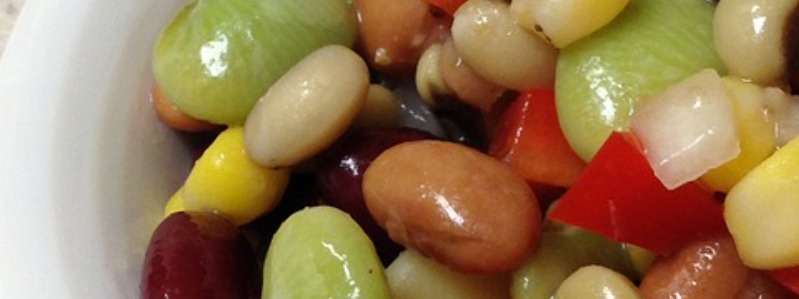
Lima Beans are a powerhouse of protein that can easily be incorporated into any meal. They provide a complete source of plant-based proteins, and their versatility makes them great for adding bulk to soups, stews, salads, and more. Just one cup of cooked lima beans contains an impressive 8.2 grams of protein. In addition to being a great source of protein, lima beans are also packed with essential vitamins and minerals. They are rich in magnesium, calcium, iron, copper, and zinc, as well as many B vitamins. Eating lima beans may help improve heart health as they contain beneficial fiber, complex carbohydrates, and resistant starch. Furthermore, they may help control blood sugar levels and can aid in weight loss due to their high protein content. Lastly, the soluble fiber found in lima beans helps lower cholesterol levels and reduce inflammation. All these benefits make lima beans a nutritious addition to any diet.
Edamame
12 grams of protein & 142 Calories
Edamame really is the perfect protein-packed vegetable. I love buying the frozen bag from Wegmans, sticking it in the microwave, and tossing it in a bowl with sea salt. Now, this is a snack you can snack on while watching a movie.
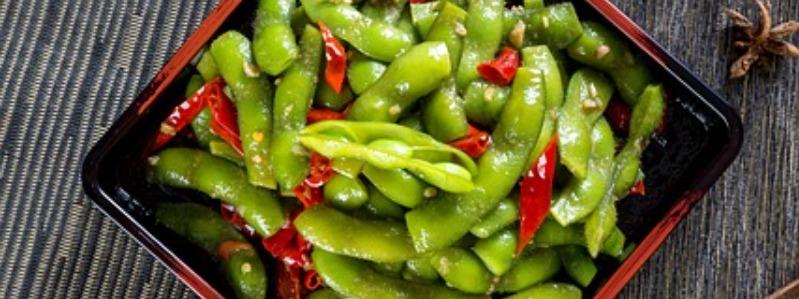
Edamame, which is a type of immature soybean, is a great source of protein. Specifically, one cup of cooked edamame contains 18 grams of protein, making it an excellent choice for vegetarians and vegans looking to boost their daily protein intake. Furthermore, edamame also provides essential amino acids such as lysine and leucine, which are necessary for muscle growth and repair.
Additionally, edamame has a range of other health benefits. It is rich in dietary fiber, vitamins A, C, E, B1, B3, B6 and folate. This makes it an excellent option for those seeking to increase their intake of micronutrients. It is also low in calories and fat.
Edamame can be enjoyed either fresh or frozen. When selecting frozen edamame, it’s important to look for varieties that are unshelled and do not contain added preservatives or flavoring. They can then be boiled or steamed and enjoyed as a snack on their own, or added to dishes such as stir-fries or salads. Edamame can also be blended into smoothies or soups for extra creaminess and flavor.
Soybean Sprouts
13.1 grams of protein & 128 Calories
Coming in first are Soybean sprouts with over 13 grams of protein, now I know 100 grams sounds like a lot, but even half of that still gives you over 6 grams of protein. I love these for their crunch. Try sauteeing them with soy sauce, sesame oil, chili powder, and sesame seeds.
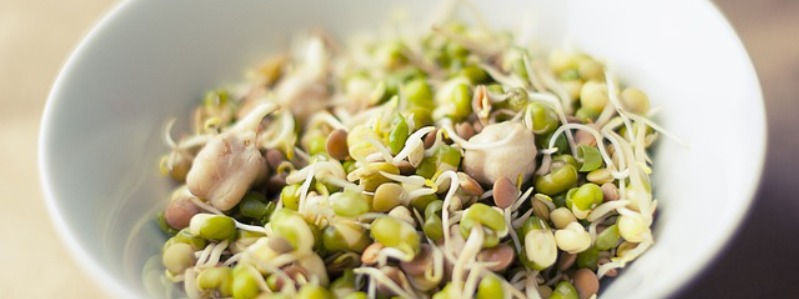
Soybean sprouts are a nutrient-dense vegetable that can be easily added to any meal. High in protein, fiber, vitamins, and minerals, soybean sprouts are an excellent source of nutrition. With their crunchy texture and mild flavor, soy bean sprouts are versatile enough to be used in salads, stir-fries, soups, and more.
Additionally, these spouts contain all nine essential amino acids, making them a complete source of protein. Soybean sprouts are also packed with fiber, providing nearly 6 grams per cup. This high fiber content aids digestion, helps reduce cholesterol levels, and supports healthy blood sugar levels.
Furthermore, soybean sprouts are notable for their vitamin content. One cup of sprouts provides nearly 8% of the daily recommended value of Vitamin C, as well as a significant amount of Vitamin A and B6. They are also an excellent source of folic acid, magnesium, phosphorus, iron, calcium, zinc, and potassium.
FAQs on Protein Rich Foods
What vegetables have more protein than meat?
Many vegetables contain more protein than meat, such as peas, broccoli, lentils, and soybeans. For example, one cup of cooked lentils contains 18 grams of protein, while one ounce of ground beef contains 7 grams of protein.
What vegetables are high in protein and low in carbs?
Some high-protein, low-carb vegetables include kale, spinach, Swiss chard, cabbage, cauliflower, broccoli, and Brussels sprouts. For instance, one cup of cooked spinach contains 5.3 grams of protein and 0.8 grams of carbohydrates.
What is a good alternative to meat for protein?
Tofu, tempeh, seitan, textured vegetable proteins (TVPs), black beans, quinoa, and hemp seeds are all excellent plant-based alternatives to meat for getting your daily dose of protein. For example, three ounces of tofu contains 8 grams of protein and only 2.4 grams of carbohydrates.
How can a vegetarian get 60 grams of protein a day?
A vegetarian can easily get the recommended 60 grams of protein per day by incorporating plenty of plant-based proteins into their diet. Eating a variety of legumes, nuts, whole grains, and seeds will help ensure that a vegetarian receives enough protein each day. Additionally, many dairy products such as yogurt and cheese provide ample amounts of protein.
What has protein but no carbs?
Many types of animal proteins such as eggs and meats do not contain carbohydrates. Additionally, some seafoods such as salmon and tuna are low in carbs as well as rich in protein. Plant-based sources of protein such as nuts, seeds and certain vegetables also have no carbs.
What foods are pure protein?
Foods that are composed entirely of protein include egg whites, whey protein isolate powder, Greek yogurt and cottage cheese. Other dietary sources that are almost purely composed of protein include fish such as halibut and salmon, along with lean cuts of poultry such as chicken breast or turkey.
What has 20 grams of protein and no carbs?
A few food options that have 20 grams of protein and no carbs include 3 large eggs, 6 ounces of canned tuna, 4 tablespoons of peanut butter, and 1 scoop of whey protein isolate powder.
How can I get 20g of protein in a snack?
There are lots of ways to get 20g of protein in a snack. You can choose from various options like 2 hardboiled eggs, 2 tablespoons hummus with 1/4 cup celery sticks, or 1 scoop whey protein isolate powder mixed with 8 ounces unsweetened almond milk.
What is a protein-rich food without sugar?
Many high-protein foods contain no added sugar or naturally occurring sugars. Some examples include Greek yogurt (17g of protein per container), cottage cheese (14g of protein per cup), eggs (6g per large egg), canned tuna (20g per 6oz can), and lean beef (18g per 3oz serving).
